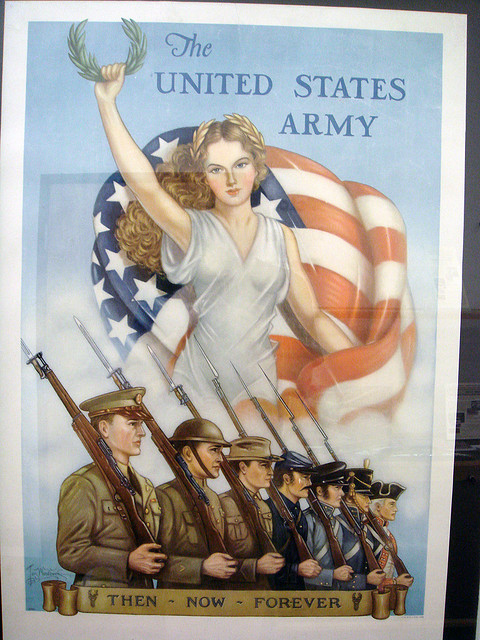Propaganda obscures American military's true role
Football abounds in war metaphors. Bo Schembechler was often referred to as “the General.” Players think of themselves as soldiers, risking body and life to move the line forward. So it should not surprise us when the sport becomes increasingly militarized, not intrinsically, but in the ever-increasing presence of the U.S. military at the games themselves, and such presence ought to concern anyone interested in a free society.
When the University of Michigan played at Northwestern, the home team was bedecked in star-spangled, blood-spattered eyesores, turning the players into billboards for the Army. Gone are the times when universities were hotbeds of anti-militarism. Instead, they have been co-opted by research dollars – the Pentagon’s 2014 budget asks for $330 million in university research initiatives, a number which doesn’t include the maintenance of university-based research centers, which would increase the amount by over $100 million – and have turned their public events into propaganda, the players themselves made avatars of military “virtues.”
The greatest divider of families in any culture is the military, a fact obscured by the rash of choreographed reunions, like the one the Detroit Lions staged Nov. 24. The conceit is simple: separate a parent from his/her spouse and children, make the family deal with their pain and isolation in private, schedule a very public “surprise” reunion to highlight their joy, then send the person back to war.
Such rituals are exploitative, manipulative, and propagandistic. They turn personal sorrow, fear and abandonment into commodities for public consumption - a consumer good for which the public seems to have an unlimited appetite. (Views on YouTube of these videos typically number in the millions.) Private moments are subjected to the public gaze, spectacles designed to reconcile the public to the high cost of America’s imperial reach – a reach demonstrated by the unparalleled command structure.
While these reunions are inherently exploitative and manipulative, the propaganda operates on a much broader scale. TV broadcasts can hardly go five minutes without a “salute” to our military veterans and families. Frequently they will show soldiers and sailors sitting in the stands. I attended a Nationals game in Washington last spring, and was struck by the frequent military invocations and the omnipresent rituals of civil religion. My guess is that if many Americans observed other countries engaged in these practices we would be skeptical and concerned. The problem, as Reinhold Niebuhr observed, is that “nations will always find it more difficult than individuals to behold the beam that is in their own eye while they observe the mote that is in their brother’s eye; and individuals find it difficult enough.”
To raise these issues is to invite opprobrium. In a country that insists “freedom isn’t free,” the language has already been debased to a point where careful deliberation melts away. George Orwell noted that when political language vaporizes, it blurs the outlines of reality in such a way that the indefensible becomes defended. The usurpation of language for military ends necessarily leads to a more acquiescent public.
Orwell further observed that brutalizing language makes life and politics more brutal. Such violence operates at its apogee at the level of abstraction – when it makes speech rote, vague or euphemistic. It distracts us from what is genuinely brutal: persons at war, and the costs of such war to American citizens. The militarization of non-military events operates as a gentle snowfall which blurs and obscures the outlines of war and envelops families in its chill.
I am not anti-military or a pacifist, but I am opposed to a public sphere which buries the fullness of truth under an avalanche of sloganeering and exploitation. The massive growth of government over the last century is due primarily to one thing: war. “War is the health of the state,” wrote Randolph Bourne, requiring the transferring of resources to a central point, and corroding the authority of all other social institutions, whose own purposes are now subordinated to war preparation and undone by the social dislocation that is war’s left hand. There is no justification for a centralized administrative state other than war, and its presence is freedom’s central threat.
How strange would it seem to us if a public address announcer at a football game welcomed all the peacemakers, all those who loved a freedom that resisted the centralizing and despotic tendencies of an imperial war state, and saluted those who simply came to enjoy the game.
See what new members are saying about why they donated to Bridge Michigan:
- “In order for this information to be accurate and unbiased it must be underwritten by its readers, not by special interests.” - Larry S.
- “Not many other media sources report on the topics Bridge does.” - Susan B.
- “Your journalism is outstanding and rare these days.” - Mark S.
If you want to ensure the future of nonpartisan, nonprofit Michigan journalism, please become a member today. You, too, will be asked why you donated and maybe we'll feature your quote next time!


 UNCLE SAM WANTS YOU: Americans are comfortable with a level of military propaganda that would be disconcerting coming from another country. (Photo by Flickr user msmail; used under Creative Commons license)
UNCLE SAM WANTS YOU: Americans are comfortable with a level of military propaganda that would be disconcerting coming from another country. (Photo by Flickr user msmail; used under Creative Commons license)